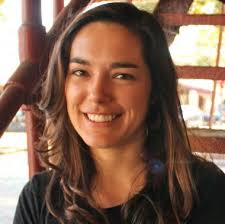Mozilla Pays It Forward
 Jen Wike HugerMozilla and seven other organizations will be participating in the Grace Hopper Open Source Day codethon taking place during the main conference event, on October 14. Emma Irwin is a Community Education Lead with Mozilla, and talks to me about why Mozilla is involved in the codethon, what she gets out of it, and what participants learn from it.
Jen Wike HugerMozilla and seven other organizations will be participating in the Grace Hopper Open Source Day codethon taking place during the main conference event, on October 14. Emma Irwin is a Community Education Lead with Mozilla, and talks to me about why Mozilla is involved in the codethon, what she gets out of it, and what participants learn from it.
I see GHC Open Source Day as an opportunity to pay it forward—to mentor, empower, and spark interest. To help women understand that they can turn up at an open project like Mozilla and find meaningful opportunities to code, teach, write, translate, design, test, and all while having positive impact on the world. It's very rewarding, and I feel fortunate for the opportunity.—Emma Irwin
Q: What made you decide to participate in the Grace Hopper Celebration Open Source Day codeathon?
I've done a lot of teaching open source participation as a "learn by making" opportunity for youth, university students, and adults in Mozilla and other open source communities. Much of my motivation comes from the personal experience of being lifted up, enabled, and skilled through the experience of contributing to open projects with missions I care about.
Q: Have you attended GHC before?
Actually, no! But I have wanted to. I'm looking forward to talking to as many women in technology as I can. I'm interested in perceptions of open source participation, what barriers exist that we can't see—how to get better at teaching and enabling more women. I also have a personal interest in helping women stay connected to innovation and navigate brogrammer cultures in technology as mothers, especially in the early years where I know we lose a lot of women.
Q: Tell us about the open source project you'll have attendees work on at the codeathon. What will they learn? And what will the project get out of the codeathon?
I am bringing the Mozilla Learning Network to the codeathon. Participants will have the opportunity to work individually or in groups to understand and contribute to the codebase (NodeJS, JavaScript, ReactJS). The project will hopefully help people report issues, understand why Web literacy matters, and learn how they can get involved with this project or in other ways like teaching and writing curriculum. We hope everyone feels a part of the Mozilla community afterwards.
Q: What are Mozilla's top priorities in the open source community right now?
I work on the participation team at Mozilla, and we are specifically focused on empowering leaders and leadership in our community, with diversity and inclusion as a key effort.
Q: What other open source humanitarian projects is your organization working with?
Mozilla Webmaker is now in beta—with a goal to ensure that the next billion people to come online for the first time through their smartphones will discover a Web that's open, participatory and invites creativity. I think what's especially cool is the focus on helping people generate locally relevant content. I was originally going to bring this project, but with the Android development environment it might be a bit too tricky for a one day codeathon.
Q: How diverse is your project's community?
Honestly we don't know. On the one hand, we have members of the community from all over the world (the largest number, by far, in India), speaking over 100 languages, and with backgrounds much broader than engineering and software. On the other hand, we haven't done a great job of tracking diversity closely or designing for it explicitly, and we are currently in the process of improving our metrics to better that.
There have been quite a few bottom-up efforts, groups of women coming together under the banner WoMoz for example. And we're involved in efforts like Outreachy and TechWomen. We are just starting the work of bringing these different efforts together into a broader plan and strategy. I'm personally excited for this.
This article is part of the Grace Hopper Celebration of Women in Computing series for GHC 2015. The annual Grace Hopper Celebration of Women in Computing is designed to bring the research and career interests of women in computing to the forefront. GHC 2015 will be held October 14-16, 2015, in Houston, Texas.
| Mozilla pays it forward was authored by Jen Wike Huger and published in Opensource.com. It is being republished by Open Health News under the terms of the Creative Commons Attribution-ShareAlike 4.0 International License. The original copy of the article can be found here. |
- Tags:
- Android development environment
- cultures in technology as mothers
- Emma Irwin
- Grace Hopper Celebration of Women in Computing (GHC 2015)
- Grace Hopper Open Source Day codeathon
- humanitarian open source software (HFOSS)
- Javascript
- Jen Wike Huger
- learn by making
- Mozilla
- Mozilla Learning Network
- Mozilla Webmaker
- NodeJS
- open source community
- open source humanitarian projects
- open source participation
- open source project
- Outreachy
- ReactJS
- TechWomen
- web literacy
- women in technology
- WoMoz
- Login to post comments